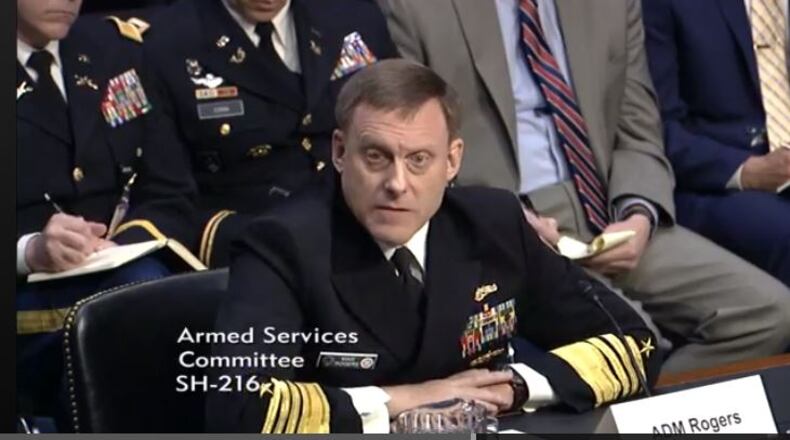The head of the National Security Agency told Congress on Tuesday that while the United States is closely watching Russian efforts to meddle in this year's U.S. elections, no specific order has been given by President Donald Trump to more aggressively go after possible Russian interference, as Democrats complained that a mild response by the Trump White House has only emboldened the Russians to do more in 2018.
"I believe that President Putin has come to the conclusion that there is little price to pay here," said Admiral Mike Rogers, the head of the National Security Agency, when asked about efforts to safeguard this year's elections from another Russian attack.
"We're taking steps, but we're probably not doing enough," Rogers said before the Senate Armed Services Committee, as Senators spent much of a two hour hearing focused on why more hasn't been done, and why the President hasn't directly ordered Rogers and his agency to be more aggressive in dealing with Russian election meddling.
"On a daily basis, I do not have the authority to do that," Rogers told somewhat surprised Senators. "I don't have the legal authority to defend a state's voting infrastructure," as Rogers predicted the Russians won't stop anytime soon.
"They haven't paid a price that's significant enough to get them to change their behavior."
"They could care less what we think, they're continuing to attack us," said Sen. Richard Blumenthal (D-CT) of Moscow, as a series of Senators expressed alarm that countering Russian operations isn't job number one in this election year.
"I want to know, why the hell not?" said Sen. Clare McCaskill (D-MO), who joined in demanding to know why President Trump has not given specific orders to stop Russian meddling in the mid-term elections.
"The notion that you have not been given this mission to stop this from happening this year is outrageous," McCaskill added.
As he did at a hearing earlier this month, Adm. Rogers said he agreed with other top intelligence officials that the Russians are intent on again using social media and other means to undermine democratic institutions in the United States.
"If we don't change the dynamic here, this is going to continue," Rogers said of Russian interference. "And 2016 won't be viewed as isolated."
In questioning by Sen. Jack Reed (D-RI), Rogers acknowledged that while he has the ability to take on the Russians in general, he does not have the authority to protect U.S. election infrastructure, or to proactively go after Russia's efforts to meddle in this year's elections.
At the hearing, the red flags about the message being sent to Russia weren't being raised only by Democrats.
"It's pretty obvious to me - as one Senator sitting here - that diplomatic efforts are failing," said Sen. David Perdue (R-GA), who said it all boils down to one basic question.
"Are we capable - the United States - of defending our election this coming year?" asked Sen. David Perdue (R-GA).
Rogers, who is retiring from the NSA in coming months, said it was clear more has to be done at all levels of government.
At one point, Sen. Richard Blumenthal (D-CT) pressed Rogers on why he had not gone to the President to ask for extra authority to take on the Russian interference efforts this year.
"Sir, I am not going to tell the President what he should or should not do," though Rogers made it very clear again that he believes more action is needed.
About the Author
The Latest
Featured



